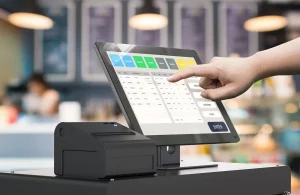Multi-Techno Integrated Solution
Table of Contents
ToggleDecoding Business Software: A Comprehensive Guide to POS vs. ERP

Making informed decisions is crucial in the ever-evolving landscape of business management software. This guide delves into the distinctions between Point of Sale (POS) and Enterprise Resource Planning (ERP) systems, helping you navigate the complexities and choose the right solution for your business.
POS vs. ERP Navigating Business Software Choices:
POS vs. ERP, Explore the nuanced differences between Point of Sale (POS) and Enterprise Resource Planning (ERP) systems. This comprehensive guide provides insights into their distinctions, ensuring you make an informed choice that aligns seamlessly with your business needs. Uncover the key features and functionalities that set POS and ERP apart, empowering you to make decisions that optimize your business operations.”
Point of Sale (POS) Unveiled
At its core, Point of Sale refers to the physical location where goods or services are purchased, and transaction data is captured electronically. Traditional POS transactions occur in brick-and-mortar stores and service-oriented businesses like restaurants, movie theatres, hair salons, and more.
A POS terminal serves as the electronic device capturing payment cardholder data at the source of the transaction. This device reads information from credit or debit cards, processes payments, and generates receipts, ensuring secure and efficient transactions.
POS Software: Tailored for Walk-in Traffic
While POS software shares some features with ERP systems, it is specifically designed for Business-To-Consumer (B2C) companies managing walk-in traffic. Ideal for retail stores, restaurants, and service businesses, POS software streamlines direct-to-consumer sales.
The key distinction lies in its suitability for businesses primarily selling goods directly to consumers through physical stores or service-oriented establishments. However, POS functionality can also benefit Business-To-Business (B2B) companies with cash-and-carry locations or showrooms for walk-in customers.
Enterprise Resource Planning (ERP) Explored
Enterprise Resource Planning (ERP) software, an all-encompassing business management solution, is on the other end of the spectrum. ERP systems integrate features for inventory management, order processing, accounting, warehouse management, contact management, purchasing, sales, financials, and more.
ERP systems often provide optional components tailored to specific industries, including point-of-sale functionality. The core idea behind ERP software is to replace all existing software packages and manage company data from a single database. This includes sales from multiple channels like retail, eCommerce, tradeshows, wholesale, and more.
POS vs. ERP Integration
For businesses with varied sales channels, ERP systems seamlessly integrate POS functionality. This integration allows users to create orders and accept payments face-to-face through POS Terminals. Simultaneously, businesses can make orders and process payments for orders received via email, phone, or other methods on the back end.
Even wholesale businesses with occasional walk-in customers can benefit from ERP systems, which offer flexibility in handling face-to-face and non-face-to-face transactions. This flexibility ensures efficient order processing, whether dealing with walk-in customers or fulfilling orders through other channels.
Beyond POS vs. ERP: eCommerce Solutions
In the modern digital landscape, eCommerce solutions are pivotal, allowing customers to place orders and submit payments online and through mobile devices. It’s essential to distinguish between POS and eCommerce solutions, where transactions are conducted electronically without face-to-face interactions.

Selecting the Right Software Vendor
Businesses often gravitate towards POS software when selecting business management software without thoroughly assessing their industry-specific needs. Prioritizing software vendors that cater to your industry is crucial, providing insights into necessary features for efficient business management.
In conclusion, whether you optimize retail transactions through POS or streamline all-in-one business processes with ERP, understanding the distinctions between these systems is paramount. Each solution serves a specific purpose, and the right choice depends on the nature of your business, the percentage of walk-in customers, and the complexity of your sales channels.
As you navigate business software, prioritize functionality aligned with your industry needs. Make an informed decision, ensuring that your chosen system meets your current requirements and scales with your business as it evolves.
About Us
ERP software and systems are designed and implemented by Multi-Techno, a registered company. By combining data from financials, sales, CRM, inventories, and operations, businesses can increase productivity, make better decisions, and increase profitability with the aid of our ERP System, a single, integrated software platform.
Quick Links
Contact Us
Office # 100, 101 Second Floor Kohinoor 1, Faisalabad, Pakistan
